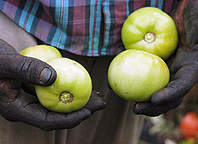 The following are just a few of the highlights from a critical analysis — produced by Dr. Bruce Nissen, Director of the Research Institute on Social and Economic Policy of Florida International University — of the recently released McDonald’s study of tomato pickers’ wages in its Florida supply chain:
The following are just a few of the highlights from a critical analysis — produced by Dr. Bruce Nissen, Director of the Research Institute on Social and Economic Policy of Florida International University — of the recently released McDonald’s study of tomato pickers’ wages in its Florida supply chain:
- “So riddled with errors both large and small that it cannot be accepted as factually accurate on virtually any measure.”
- “Almost nowhere are ordinary norms of social science research followed.”
- “The report should have no credibility whatsoever.” CLICK HERE TO SEE CRITIQUE IN FULL
What could possibly have provoked such a strong condemnation by this nationally respected expert on wages and labor market conditions in Florida? For months now, McDonald’s spokespeople have pointed excitedly to the pending results of a study, commissioned and funded by McDonald’s, that the company hinted would vindicate them by proving that tomato pickers in their supply chain are in fact not poor and  do not need a raise. This past week, the preliminary results of the study were released, purporting to show, remarkably, that tomato pickers earn upwards to $18.27 per hour and average around $14 per hour… Yes, you read that right — tomato pickers earn upwards to $18.27/hr and average around $14/hour.
do not need a raise. This past week, the preliminary results of the study were released, purporting to show, remarkably, that tomato pickers earn upwards to $18.27 per hour and average around $14 per hour… Yes, you read that right — tomato pickers earn upwards to $18.27/hr and average around $14/hour.
But beyond this fantastic claim — which would place the highest earning tomato pickers above the 70th percentile of all Florida wage earners, according to the 2005 report, “The State of Working Florida” — the McDonald’s study is a compendium of mathematical errors and baseless opinion that certainly can’t be called science. Instead, it can only be considered a clumsy, thinly-veiled public relations gambit that casts an unflattering shadow on McDonald’s efforts to appear sincerely interested in the welfare of the men and women who pick the fast-food giant’s tomatoes.
But don’t take our word for it, here’s another assessment of the study, by Dr. Fred Seidl, Dean Emeritus, State University of New York at Buffalo:
“I was horrified by the lack of methodological sophistication, low level statistical competence, and simple computational errors. The analysis of qualitative findings ignored anything resembling standard social science procedures. Much of the report is simply the listing of unsupported opinions. It seems clear who paid for the study. I am a social scientist, first and foremost, and there is no way this would have survived a Master’s degree defense. The result is misinformation, and no policy decision should rest in any part on this study.”
And this, by twenty-nine labor law and labor relations scholars who wrote, in support of Dr. Nissen’s critique:
“… We affirm the conclusions in Professor Bruce Nissen’s response to the recent report, commissioned by McDonalds, on Florida farmworkers’ working conditions. We agree that the McDonalds report does not meet accepted standards of research, and its findings and conclusions should not be taken seriously.”
From the outset, McDonald’s has attempted to respond to the human rights crisis in Florida’s tomato fields as if it were a problem that could be solved with public relations measures. The fast-food leader has approached the Campaign for Fair Food as little more than a fire to be put out with a slick package of empty gestures designed to fool the public and aggressive outreach aimed at dividing the alliance of farmworkers, human rights, religious, student, and community groups that established real precedents for social responsibilty in the fast-food industry through the Taco Bell boycott.
that established real precedents for social responsibilty in the fast-food industry through the Taco Bell boycott.
Surely that strategy looked good on paper when it was first proposed by the PR consultants tasked with putting together a response to the CIW campaign. But we can only hope that this fiasco of a study will finally mark the end of that phase of McDonald’s response and bring about a new phase in which the restaurant giant works with the CIW to ensure a future of truly fair wages and working conditions in the fields where it buys millions and millions of pounds of tomatoes every year.
